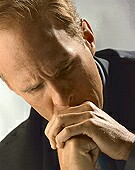
MONDAY, Oct. 20, 2014 (HealthDay News) — During the recent “Great Recession,” worries about the cost of raising children in an uncertain job market may have spurred an uptick in vasectomies, a new study suggests.
“Despite an unchanged desire for more children, men in relationships reported planning for smaller families,” said a team led by Dr. Bobby Najari, a urologist at Weill Cornell Medical College in New York City.
Najari and colleagues reported the findings Monday in Honolulu at the annual meeting of the American Society for Reproductive Medicine (ASRM).
In a vasectomy, the sperm-transport system is interrupted by blocking the structure known as the vas deferens, which carries sperm from the testicle to the urethra. If a man changes his mind about wanting children, a reversal often can be done.
Prior studies have pointed to a trend of rising vasectomy rates as the economy declined. Speaking to HealthDay in March of 2009, Dr. Marc Goldstein — a co-author on the new study who is also at Weill Cornell — said that his office had noticed an upsurge in vasectomy requests.
“I used to do one to two every Friday. Now I’m doing three on Fridays. There’s been a significant increase,” Goldstein said.
“Nobody came in and said they were having a vasectomy because the [stock] market crashed,” Goldstein added. “Most are saying, ‘We’ve been thinking about it for a long time,’ and [the crash] influenced their decision. They’re saying with the cost of private school for three kids, they can’t afford to have another one.”
Another study, this one published at last year’s ASRM meeting, found a similar trend. That research, led by Dr. Anand Shridharani of Erlanger Health System in Chattanooga, Tenn., looked at data from men having vasectomies at a facility at the Medical College of Wisconsin.
Again, the study found that “as the median income for Wisconsin declined, the rate of vasectomies annually went up,” Shridharani said.
The new study is different because it relied not on data from a particular medical center, but on countrywide data from the National Survey for Family Growth.
In the study, Najari and Goldstein, along with co-author Dr. Peter Schlegel, looked at data on almost 9,000 adult men. The data covered the time of the recession (as defined by the National Bureau of Economic Research), from December 2007 through June 2009.
According to the researchers, the survey found “no change in the proportion of men who wanted more children,” which stayed steady at about 68 percent.
However, that desire was perhaps tempered by economic realities, because “men interviewed after the recession [began] planned on having fewer children,” the study found.
Overall, the recession appeared to be tied to a 28 percent rise in the odds that a man would undergo vasectomy, the Cornell team said. Vasectomy rates rose from 3.9 percent of men interviewed before the recession to 4.4 percent after the economic downturn.
At the same time, the percentage of men who had full-time work and/or medical insurance declined, the researchers pointed out.
Of course, while the study can point to an association between poorer economic times and a rise in vasectomy rates, it cannot prove a cause-and-effect relationship. In addition, findings reported at medical meetings are typically considered preliminary until published in a peer-reviewed journal.
Still, the researchers believe the study supports the notion that “interest in vasectomy may vary based on economic factors, given the financial impact of child rearing.”
More information
Find out more about vasectomy at the American Urological Association.
Copyright © 2026 HealthDay. All rights reserved.

